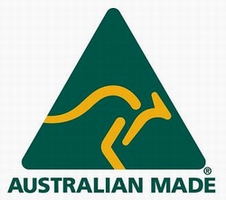 ustralian-made products rated highly among Australian consumers, according to new findings from market research organisation Roy Morgan Research.
ustralian-made products rated highly among Australian consumers, according to new findings from market research organisation Roy Morgan Research.The research found that 87.4 per cent of Australians more likely to buy food produced in Australia, while 88.5 per cent of Australians aged 14 plus said they were more likely to buy Australian-made products across all categories over products manufactured in other countries.
The US and the UK also rated highly, with 56.2 per cent of Australians saying they’d be more likely to buy US-made products and 53.8 per cent saying they would prefer to buy UK-made products. New Zealand also fared well, with 52.8 per cent of Australians citing a preference for products made in New Zealand.
However, Australians were less likely to choose products made in Indonesia (10.8 per cent), India (13 per cent) and Chile (9.6 per cent).
Data also indicated that an individual’s country of birth does have some bearing on their purchasing choices – but did not necessarily mean they would choose products from their birth country. While an overwhelming 90.3 per cent of people born in Australia will opt for Australian-made goods given the opportunity, this figure is matched by people born in Canada – and topped by those born in the US, 90.7 per cent of whom are more likely to buy a product if it’s Australian-made.
The proportion of people born in Asia who prefer to buy Australian-made is slightly lower (78.9 per cent), but is still higher than the number who would be likelier to buy products made in Japan (54.3 per cent), China (39 per cent) or Korea (33.6 per cent).
Australia and China
Roy Morgan research reported that when people surveyed were asked to state their purchasing preferences for food, wine clothes, electrical goods, motor vehicles, and sporting goods made in Australia and China, some distinct trends emerged.
While 87.4 per cent of the Australian population was more likely to buy food produced in Australia, only 5.6 per cent of the population said they were more likely to buy food produced in China.
Australian-made wine was similarly popular, with 73.1 per cent of Australians preferring locally-made, compared to just 2.9 per cent who would choose Chinese wine.
Clothes were another popular sector for Australian-made, with 75.2 per cent of respondents saying they would prefer to buy locally-manufactured clothes. But Australian-made cars did not hold the same appeal. A comparatively low 55.5 per cent said they would be more likely to buy a care if it was Australian-made, with the percentage falling to 36.6 per cent of people born in Asia.
Meanwhile, Roy Morgan suggested Chinese manufacturers might have a way to go if they were looking to conquer the Australian market. A modest 32.3 per cent of Australians reported a preference for Chinese-made clothes, 27.7 per cent a preference for Chinese-made electrical goods, and 15.9 per cent for sporting goods.
Although people born in Asia were more likely to choose Chinese-made products than the average Australian, Roy Morgan reported that they still preferred products labelled ‘made in Australia’ over those made in China.
“Whether it’s due to the success of the long-standing Australian Made campaign, a genuine quality issue or simply good old Aussie patriotism, an overwhelming majority of Australians are more likely to buy something if they know it’s made here,” said Norman Morris, Industry Communications Director, Roy Morgan Research.
“While there are slight variations if we take a person’s country of birth into consideration, Australian-made is still more consistently popular than products manufactured elsewhere,” Mr Morris said. “People born in the US are especially fond of locally-produced goods, sometimes even more so than those born here,” he said.
“Not only are these results encouraging for local manufacturers, they reinforce the value of the ‘Australian-made’ angle when marketing home-grown products,” Mr Morris added.
Respondents were asked about their purchasing preferences for products made in 18 countries: Australia, Canada, Chile, China, France, Germany, India, Indonesia, Italy, Japan, Korea, New Zealand, South Africa, Spain, Sweden, Thailand, the UK and the US.





